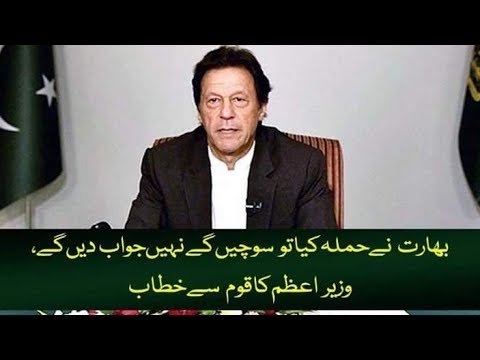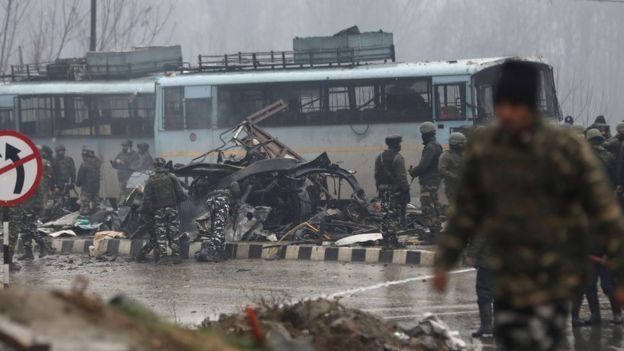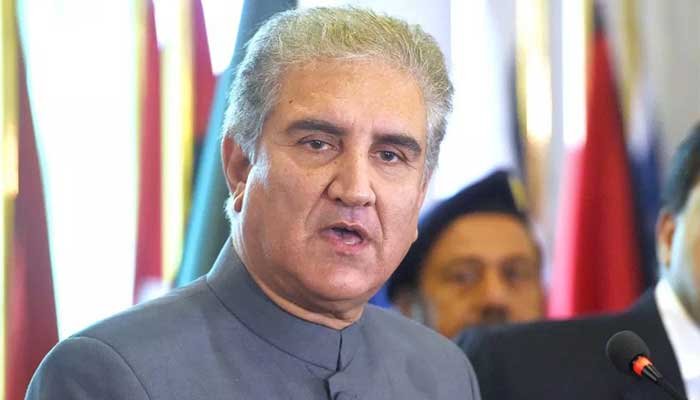Reuters
 Pakistan has warned it will retaliate if India takes military action against it after a militant attack on Indian forces in Indian-administered Kashmir.
Pakistan has warned it will retaliate if India takes military action against it after a militant attack on Indian forces in Indian-administered Kashmir.
Prime Minister Imran Khan went on television on Tuesday to call on India to provide evidence to support its claims that Pakistan was involved.
India responded that Mr Khan was again making excuses.
Prime Minister Khan said his country had nothing to do with a suicide bombing that killed 40 Indian troopers in Kashmir, adding that tensions can only ease with dialogue.
Khan said India had “leveled allegations against Pakistan without any evidence” and his government was ready to cooperate with New Delhi in investigating the blast in Indian-administered Kashmir.
“If you think that you will launch any kind of attack on Pakistan, Pakistan will not just think about retaliation, Pakistan will retaliate,” he said, adding that only dialogue could help solve issues in Kashmir.
Mr Khan, who took office last year, said his government was ready to co-operate with India in investigating the attack. But he also said Delhi should reflect on why Kashmiri youth had reached a point where they no longer feared death.
The prime minister said he had not addressed the attack earlier because of Saudi Crown Prince Mohammed bin Salman’s high-profile visit to Pakistan on Sunday and Monday.
Pakistan seeks UN intervention
Pakistan’s Foreign Minister Shah Mahmood Qureshi appealed to the UN Secretary General on Tuesday to help ease tension with India that has escalated sharply following a suicide bomb attack in the Indian part of disputed Kashmir, that India blamed on Pakistan.
Indian Prime Minister Narendra Modi, facing an election by May, has warned Pakistan to expect a “strong response” to the bombing raising fears of conflict between the nuclear-armed neighbours.
“It is with a sense of urgency that I draw your attention to the deteriorating security situation in our region resulting from the threat of use of force against Pakistan by India,” Qureshi wrote to UN Secretary General Antonio Guterres.
“It is imperative to take steps for de-escalation. The United Nations must step in to defuse tensions,” he wrote, blaming India for deliberately ratcheting up its hostile rhetoric for domestic political reasons.
“Attributing it to Pakistan even before investigations is absurd,” Qureshi said.
“India must be asked to conduct an open and credible investigation on Pulwama incident,” he said.
Muslim-majority Jammu and Kashmir, a former princely state on the border between India and Pakistan, has been in dispute since the partition of India in 1947.
Control is split between the two countries but each claims the region in full.
The neighbours have fought three wars since 1947, two of them over Kashmir. They have fought countless skirmishes along their de facto border, whic

h the UN monitors, in the Himalayan region.
MILITARY BUDGET
In 2018, India allocated Rs4 trillion (44.85 billion pounds), or 2.1 percent of its gross domestic product (GDP), to support its 1.4 million active troops, according to the International Institute for Strategic Studies (IISS).
Last year, Pakistan spent Rs1.26 trillion ($11 billion), about 3.6 percent of its GDP, on its 653,800 troops. It also received $100 million in foreign military assistance in 2018.
Between 1993 and 2006, more than 20 percent of Pakistan’s annual government expenditure was spent on the military, according to estimates from the Stockholm International Peace Research Institute (SIPRI).
The military accounted for 16.7 percent of government spending in 2017, it said.
By comparison, India’s military spending as a percentage of its government expenditure remained under 12 percent during the same period, according to SIPRI. It was 9.1 percent in 2017.
MISSILES AND NUCLEAR WEAPONS
Both nations have ballistic missiles capable of delivering nuclear weapons. India has nine types of operational missiles, including the Agni-3 with a range of 3,000 km (1,864 miles) to 5,000 km (3,106 miles), according to the Center for Strategic and International Studies (CSIS) in Washington.
Pakistan’s missile programme, built with Chinese assistance, includes mobile short- and medium-range weapons that can reach any part of India, CSIS said. The Shaheen 2 has the longest range, of up to 2,000 km (1,242 miles)
Pakistan has 140 to 150 nuclear warheads, compared with India’s 130-140 warheads, according to SIPRI.
ARMY
India has a 1.2 million-strong army, supported by more than 3,565 battle tanks, 3,100 infantry fighting vehicles, 336 armored personnel carriers and 9,719 pieces of artillery, according to IISS.
Pakistan’s army is smaller, with 560,000 troops backed by 2,496 tanks, 1,605 armored personnel carriers, and 4,472 artillery guns, including 375 self-propelled howitzers.
Despite its larger army, the capability of India’s “conventional forces is limited by inadequate logistics, maintenance and shortages of ammunition and spare parts”, IISS said in a report this month.
AIR FORCE
With 127,200 personnel and 814 combat aircraft, India’s air force is substantially larger but there are concerns about its fighter jet fleet.
India’s defence plans require 42 squadrons of jets, about 750 aircraft, to defend against a two-pronged attack from China and Pakistan. With older Russian jets like the MiG-21, first used in the 1960s, retiring soon, India could have 22 squadrons by 2032, officials say.
Pakistan has 425 combat aircraft, including the Chinese-origin F-7PG and American F-16 Fighting Falcon jets. It also has seven airborne early warning and control aircraft, three more than India, IISS said.
“The (Pakistan) air force is modernizing its inventory while improving its precision-strike and ISR (intelligence, surveillance, and reconnaissance) capabilities,” IISS said in its 2019 assessment.
NAVY
India’s navy consists of one aircraft carrier, 16 submarines, 14 destroyers, 13 frigates, 106 patrol and coastal combatant vessels, and 75 combat capable aircraft. It has 67,700 personnel, including marines and naval aviation staff.
Pakistan, which has a significantly smaller coastline, has 9 frigates, 8 submarines, 17 patrol and coastal vessels, and 8 combat capable aircraft.–Reuters

The High Asia Herald is a member of High Asia Media Group — a window to High Asia and Central Asia

